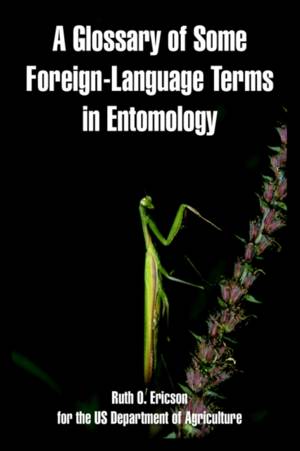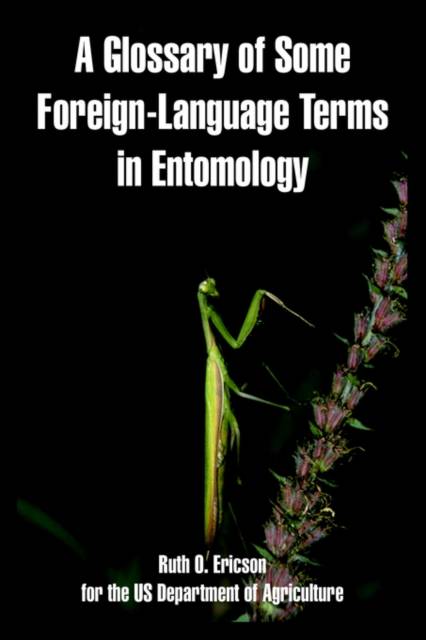
- Retrait gratuit dans votre magasin Club
- 7.000.000 titres dans notre catalogue
- Payer en toute sécurité
- Toujours un magasin près de chez vous
- Retrait gratuit dans votre magasin Club
- 7.000.0000 titres dans notre catalogue
- Payer en toute sécurité
- Toujours un magasin près de chez vous
A Glossary of Some Foreign-Language Terms in Entomology
Ruth O Ericson, Us Department of Agriculture
Livre broché | Anglais
30,95 €
+ 61 points
Description
Translating scientific papers from foreign languages into English requires more than finding English equivalents in a dictionary. Sometimes the foreign words do not appear in the foreign-language dictionary or the equivalents cited for them are unsuitable. At other times the choice of equivalents is so wide that proper selection of the preferred English term is difficult. Dictionaries seldom make shades of meaning clear; they can usually be gleaned only from the context of the paper itself, from illustrations accompanying it, from a knowledge of the insect concerned, or by consulting European entomologists familiar with the common words in technical use. In older papers on entomology European writers used Latin technical terms in describing the parts of an insect's body, as American entomologists still do. But in the 1930's many European writers began to replace such technical terms by words from the common speech. Instead of the Latin, and hence universal, "abdomen," some German writers first adopted "Bauch" for the third section of an insect body. Since this word means abdomen or venter in man, it was not precise enough to designate the abdomen in insects. Therefore "Hinterleib" [= hinder part of the body] is now more generally used for abdomen; whereas "Bauch" is employed to mean the venter or sternum of the abdomen in insects, in more recent literature. These common words tend to be used loosely and inconsistently. Of two Russian collaborators in papers on grasshoppers, for instance, one uses a different Russian word for the sternum and the thorax, but the other uses the same Russian word for both. Many of these terms are not the ones preferred by European specialists in entomology. Many were incorrectly used by amateurs, or by entomologists writing in a language other than their own. Hence the terms appearing in this Glossary are not necessarily the ones used by the best writers, but the equivalents given for them were found to be those best suited for the purpose of a given translation. Miss Ericson had completed the manuscript for this glossary, but had no opportunity to review the proofs, at the time of her death on October 9, 1961.
Spécifications
Parties prenantes
- Auteur(s) :
- Editeur:
Contenu
- Nombre de pages :
- 68
- Langue:
- Anglais
Caractéristiques
- EAN:
- 9781410216892
- Date de parution :
- 08-10-04
- Format:
- Livre broché
- Format numérique:
- Trade paperback (VS)
- Dimensions :
- 152 mm x 229 mm
- Poids :
- 113 g

Les avis
Nous publions uniquement les avis qui respectent les conditions requises. Consultez nos conditions pour les avis.






